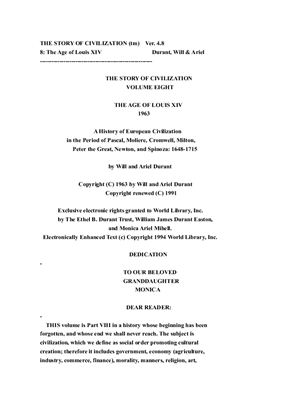Simon & Schuster, 1980. - 948 p.
"A gigantic gallery of personages and periods in the 17th century, another cultural panorama from Will and Ariel Durant, part of that installment-opus they call The Story of Civilization. Like its predecessors, the chapters are cineramas of information, replete with research, richly rendered, solidly synthesized- probably the best middlebrow reconstruction we have. As the Durants see it, the 17th century was a checkerboard battleground between the forces of faith and the forces of reason; as the reader sees it, Newton's 3rd law sums up the struggle: To every action there is always opposed an equal reaction".
Thus the century spened with the ascendant la gloire of Louis XIV, a court of social splendors and political absolutism, only to topple into the ash heap during the wars of the Spanish succession, whereby France lost all and the empires of Austria and England emerged. The era marked the advancement from superstition to scholarship. but even there the securring upsets held: Descartes began with doubt, ended with piety; Pascal clutched ?artesianism, then denounced it; steel-hearted Cromwell roused the harlot-hating ?uritans, but they were both dumped by the Restoration and lush-living Charles II; against mordant, misanthropic Swift, who kept his birthday as a day of mouing, ?aintly Spinoza pitted a pantheistic gospel of love; Hobbes sanctioned the supreme will of the state, Locke beat the drum for a liberal democracy; etc., etc. The ?urants mix chit chat (most of the philosophers never married; General Vendome appeared without nose, having sacrificed it to spirochetes) with huge hunks of treatises, letters, jouals, poems. They are always erudite, almost always readable; some parts do sag, some parts are dull, but as Elizabeth Barrett consoled Robert Srowning vis a vis some sections of Sordello, these are, after all, "only spots on the sun". (Kirkus Reviews)
"A gigantic gallery of personages and periods in the 17th century, another cultural panorama from Will and Ariel Durant, part of that installment-opus they call The Story of Civilization. Like its predecessors, the chapters are cineramas of information, replete with research, richly rendered, solidly synthesized- probably the best middlebrow reconstruction we have. As the Durants see it, the 17th century was a checkerboard battleground between the forces of faith and the forces of reason; as the reader sees it, Newton's 3rd law sums up the struggle: To every action there is always opposed an equal reaction".
Thus the century spened with the ascendant la gloire of Louis XIV, a court of social splendors and political absolutism, only to topple into the ash heap during the wars of the Spanish succession, whereby France lost all and the empires of Austria and England emerged. The era marked the advancement from superstition to scholarship. but even there the securring upsets held: Descartes began with doubt, ended with piety; Pascal clutched ?artesianism, then denounced it; steel-hearted Cromwell roused the harlot-hating ?uritans, but they were both dumped by the Restoration and lush-living Charles II; against mordant, misanthropic Swift, who kept his birthday as a day of mouing, ?aintly Spinoza pitted a pantheistic gospel of love; Hobbes sanctioned the supreme will of the state, Locke beat the drum for a liberal democracy; etc., etc. The ?urants mix chit chat (most of the philosophers never married; General Vendome appeared without nose, having sacrificed it to spirochetes) with huge hunks of treatises, letters, jouals, poems. They are always erudite, almost always readable; some parts do sag, some parts are dull, but as Elizabeth Barrett consoled Robert Srowning vis a vis some sections of Sordello, these are, after all, "only spots on the sun". (Kirkus Reviews)

